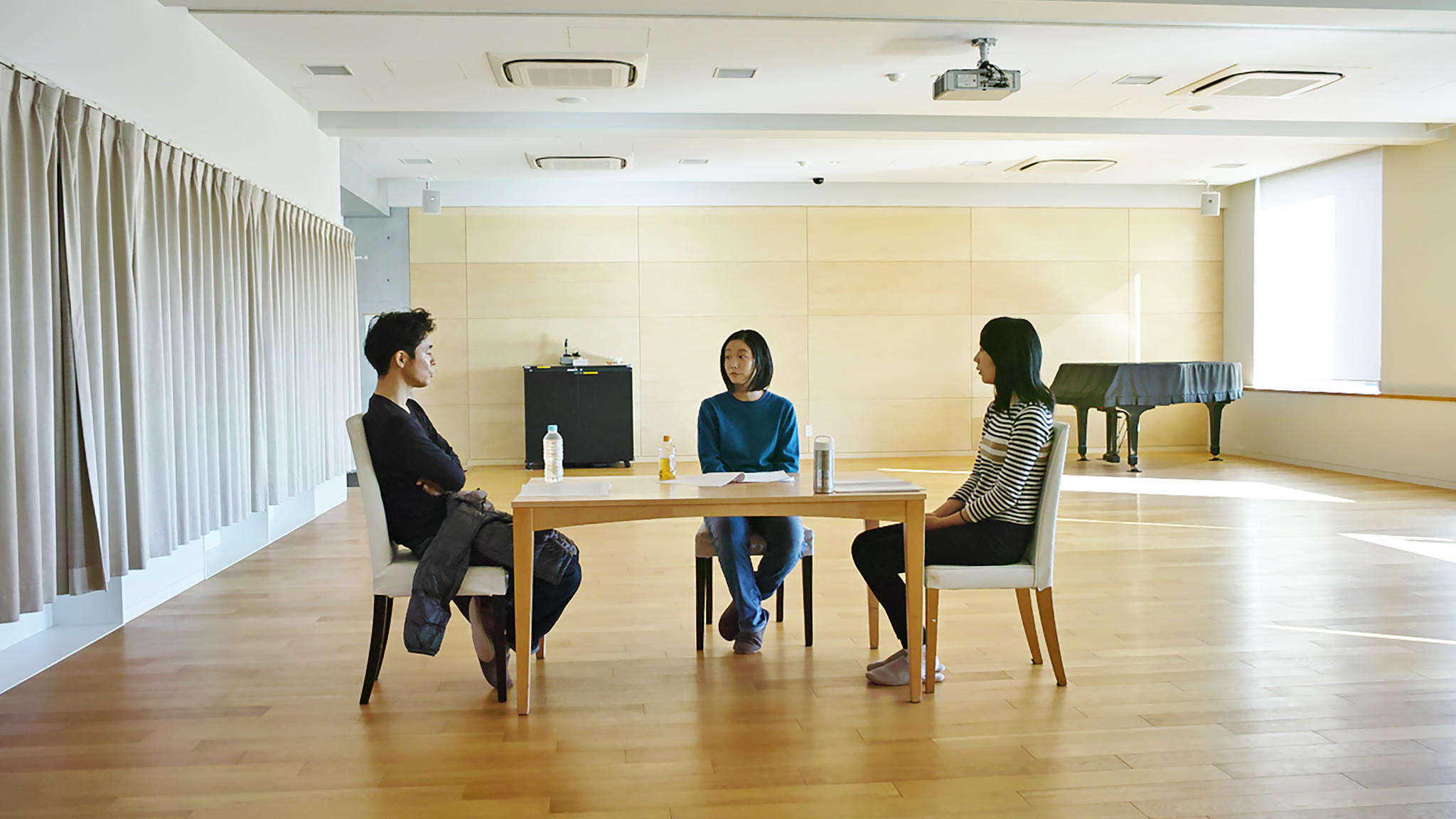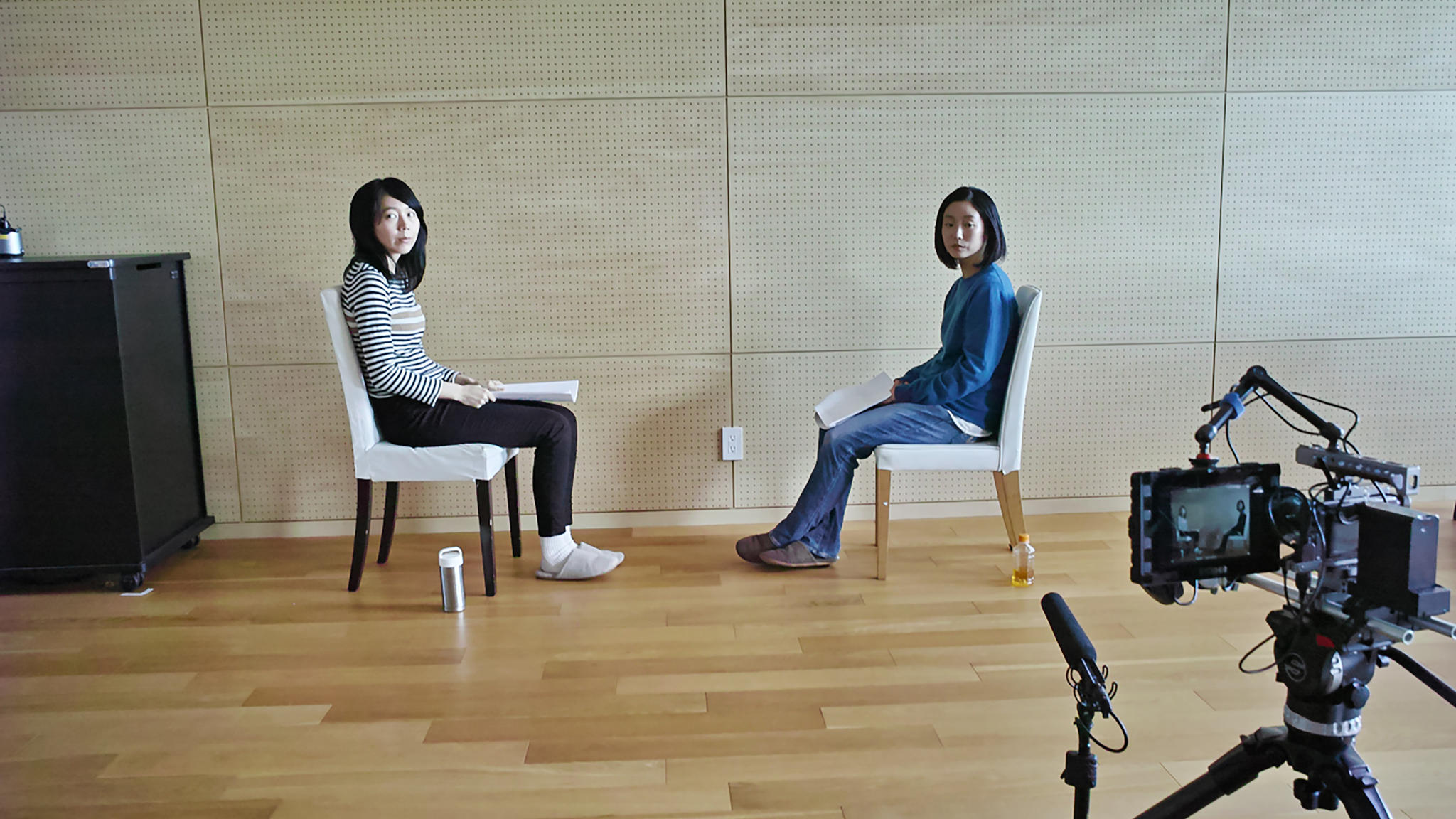Director: Natsuka Kusano
Screenplay: Tomoyuki Takahashi
Cast: Asami Shibuya as Aki
Takemoto; Tomo Kasajima as Nodoka; Adachi Tomomitsu as Naoto
 In a room, a woman named Aki is
being read her own statement by a member of the legal system, confessing to
having drowned the daughter of an old female friend whilst visiting the family.
Recounted for clarification and confirmation, we learn of the premise. Most
films would flashback - to how this woman, who knew her friend since childhood,
would push her infant daughter off a bridge during a storm. Domains however
cuts to the actors (Asami Shibuya as
Aki, Tomo Kasajima as her old friend
Nodoka and Adachi Tomomitsu as the latter's
husband Naoto) reading out lines as one would do for dress rehearsals, and this
entire film for two and a half hours is a hypothetical film which conjures this
tale entirely in the viewer's imagination.
In a room, a woman named Aki is
being read her own statement by a member of the legal system, confessing to
having drowned the daughter of an old female friend whilst visiting the family.
Recounted for clarification and confirmation, we learn of the premise. Most
films would flashback - to how this woman, who knew her friend since childhood,
would push her infant daughter off a bridge during a storm. Domains however
cuts to the actors (Asami Shibuya as
Aki, Tomo Kasajima as her old friend
Nodoka and Adachi Tomomitsu as the latter's
husband Naoto) reading out lines as one would do for dress rehearsals, and this
entire film for two and a half hours is a hypothetical film which conjures this
tale entirely in the viewer's imagination.
Domains' director Natsuka Kusano is a new figure. She is
helped by screenwriter Tomoyuki Takahashi,
who is of note as he helped write the script to Ryusuke Hamaguchi's Happy
Hour (2015). Happy Hour was a
drama over five hour longs, where the four actresses playing the four female
friends in their mind-thirties collaborated in the production. It is a great
film, but alongside its scope in length, it had moments which disrupt
conventions of storytelling that are usually expected for simplicity. One such
moment, comparable to Domains, is
the first hour having a retreat with a workshop that lasts a long time in
length, entirely built on characters talking and interacting. Domains take a very meaningful and
complex plot, based on very dark subject matter, but tells it not through the
images but performance and repetition.
The scenes we see are only a
handful but, if locked into the film's groove, they acquire greater meaning.
The friend Nodoka is married to a teacher Naoto, a very strict man whose over
protectiveness with his daughter is problematic as it is insinuated by our lead
that her friend was being ground down by work and home life. Said lead Aki is
also complex, a woman who had just stopped going to work and is suffering
though clear issues herself, which the husband sees as a bad influence on his
daughter. When the girl, never role played by a child actor but a literal
invisible kid for the dining room scene, develops a fever is the moment the
tensions mount, as he even accuses Aki to her face that she should go to a
mental asylum, believing her psychological issues are infectious to his child.
He convinces his wife to ask the lead to leave, straining a childhood
friendship, but a storm prevents anyone from leaving to back home.
Acted between staged performance
and takes of a film, Domains breaks
the fourth wall continually with clapper boards and cameras seen, the
repetition is to be accepted or becomes a detriment. The one flaw I had is that
Natsuka Kusano and Tomoyuki Takahashi did not embrace the
style fully, Domains a film that
should have visually taken the formalist aesthetic in direction whilst the
script should have taken its deconstruction even further to an extreme. What is
there however, getting into this groove as I was prepared for what was supposed
to be a difficult film, is fascinating in still having a very emotional drama
whilst also playing to the viewer's imagination.
The few scenes through the film
build in layers as they repeat. The most prominent scene for me is at the
dining table. The women have a low view of the husband's place of work, a
school which is viewed by them to be full of delinquents and for an art teacher
like himself only to find inspiration in graffiti. He denies this, defending
the school as having improved, showing however the more the scene and his lines
are repeated a sense of wanting to be seen as more respectable, his role as a
teacher likely to have unfortunately influenced his parenting as it accused to
be to a detriment. Likewise an anecdote of the two female characters'
childhood, building a makeshift fort, becomes important with the sense Aki has
a fixation over the other in terms of this friendship, which is changed when it
is severed. This is also important from a code they created for entry in the
fort, which develops greater ominous weight when it comes to the lead with the
daughter, realising the girl "is not her" in a stressful moment
where, without previous malice, a violent thought passes her mind at a tipping
point.
Scenes and ideas like this are
inferred to only. The viewer has to conjure and construct these images in
thought. The one exception, suggesting an alternative path for the film which
is never goes down, is when a scene is replayed in a street as an actual fully
developed sequence, a sudden shock with great effect. The film in its very
nature is abstract in the sense that removing the signifiers, telling not by
images the plot but recreating them in how the storytellers talk of them and
"act" their lines, unconventional in that like literature you have to
construct them in one's thoughts and are given enough times over each scene for
these recreations to evolve over time. I did not find anything a struggle at
all, probably because more extreme examples of this are in existence like the
work of Jean-Marie Straub and Danielle Huillet, the logical extreme to
this style where (even in period costume and locations) their actors are taught
to act in a subdued form, with little beyond the actors talking to work from
for more difficult text choices and extreme minimalism.
Domains would work as a stage play, on stage or the audience
permitted to look over the casts' shoulders without interacting, very much also
in an area like Dogville (2003) with
even less cast and props. It works as a film though as this repetition of a novelette
of scenes, which grows in nuisance, leads to them become new again as you
reconsider what they mean. Against, it may have taken this further if formal
rigidness was used more, but Domains'
artistic presentation is a reward, especially because the story has actual
weight to it. One which is a very complex one when unpicked - friendship being
darkened, questions of traditional roles for women and criticisms of parenting,
even the taboo of whether family life and children is a good thing for every
person. These themes overlap every time a scene replays and changes, lines hard
so many times idiosyncrasies develop. Even in one viewing, this is a rare film
where you can gain the level of knowledge one would usually get from rewatching
a whole feature, which is a rare thing to say, which makes one wonder how
rewatching such a production would change Domains'
tone over time.
Abstract Spectrum: Avant-Garde/Minimalist/Repetitious
Abstract Rating (High/Medium/Low/None): Medium



No comments:
Post a Comment